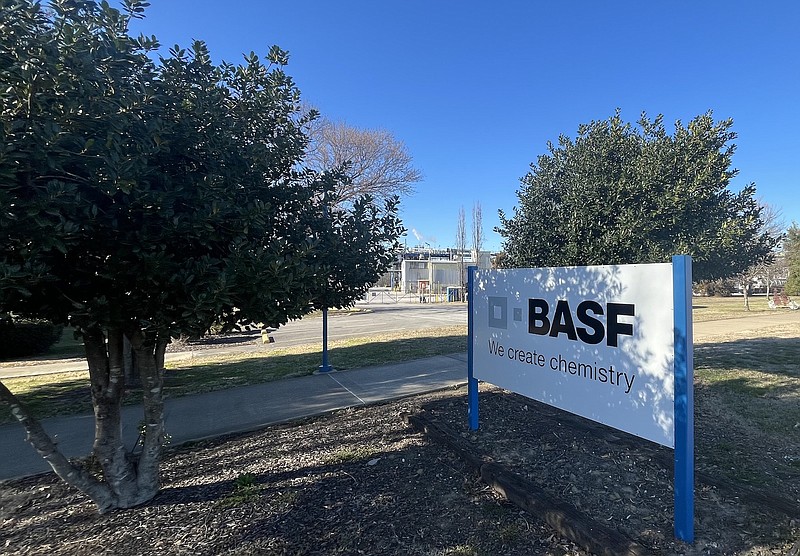The largest chemical producer in the world has pledged to become a net-zero contributor of carbon emissions by 2050 and is on pace to reach its interim goal of cutting its greenhouse emissions by at least 25% below its 2018 levels by 2030 at its plants in Chattanooga and around the globe, the Chattanooga Engineering Club was told Monday.
BASF Corp., the German chemical giant which operates two polymer production plants in Chattanooga, is investing more than $4 billion to engineer and develop new ways to make and recycle products with less energy worldwide and reverse its carbon footprint.
"BASF is a large chemical company, and we created some of the problems that we face in our world right now," Denise Hartmann, a senior vice president for BASF Corp., told Chattanooga Engineers on Monday during the kickoff to this year's Engineer Week. "We know that and acknowledge that. The spirit of innovation around the chemical manufacturing and the products that comes from engineering and manufacturing in chemistry, while they have enabled so much of our world today, has also contributed to much of the challenge we are facing on our planet today."
Hartmann, who is responsible for the North and South American division of BASF's dispersions and resins business unit, said engineers are critical to solving the global climate challenge and other environmental challenges in today's increasingly technology-based economy.
"At BASF, we absolutely see that chemistry is required for sustainable futures, and we strive to create that chemistry," she said. "We do see chemistry as the enabler for solving a lot of the challenges that we've experienced."
(READ MORE: New site director named at BASF plant in Chattanooga)
BASF employs more than 10,000 engineers and scientists and others working in research and development for chemical products. BASF products are used in formulations for construction chemicals, adhesives and printing and packaging products.
In Chattanooga, the BASF plant at 2120 Polymer Drive began operations in 1964, and BASF's other Chattanooga plant at 32 Lost Mound Drive started production in 1971.
The BASF Tennessee plants in Chattanooga and in Sparta collectively employ about 300 employees, and Hartmann said she expects staffing will remain near those levels this year. In the current tight labor market, BASF is offering signing bonuses, potentially up to $7,000 for veteran relocations or those joining the company.
"We are committed to empowering all employees to be the best they can be by fostering a culture of teamwork," Shelly King, the new site director for BASF in Chattanooga, said last month when she was named to her new positon. "Safety and environmental stewardship will remain at the forefront of our operations."
BASF was the first manufacturer in Chattanooga to adopt TVA's Green Switch, which ensures all the electricity provided comes from renewable sources. BASF pays a slightly higher power rate, but the Green Power program ensures all the electricity delivered to BASF is renewable and carbon free. TVA supplies those signed up for its Green Switch program with solar-generated electricity.
BASF also has developed a biomass balance process for the use of renewable raw materials in the chemical industry. That approach allows fossil raw materials to be replaced by renewable raw materials in BASF's production and supply process.
"We're going to do what is right and then the money and how this is going to be paid for will follow," Hartmann said. "We can't wait for consumers and others along the value chain to be ready. We need to do what is right, and the economics will follow over time."
Chattanooga Mayor Tim Kelly, who updated the city's climate action plan last year and has pledged to make all city operations carbon free by 2040, praised BASF's commitment to more sustainable manufacturing.
(READ MORE: Chattanooga City Council OKs mayor's climate action plan in 5-2 vote)
"Our climate action plan is very much aligned with what BASF is doing, and I love what you said about doing what is right and the economics will follow," Kelly told Hartmann during Monday's luncheon on the campus of the University of Tennessee at Chattanooga. "Being more efficient is also cheaper."
Chattanooga's environmental strategy sets a goal of making all city operations carbon neutral by 2040 and decarbonizing the entire community by 2050 to improve public health and spur the city's growing green economy and natural appeal, Kelly said.
Contact Dave Flessner at dflessner@timesfreepress.com or 423-757-6340.
